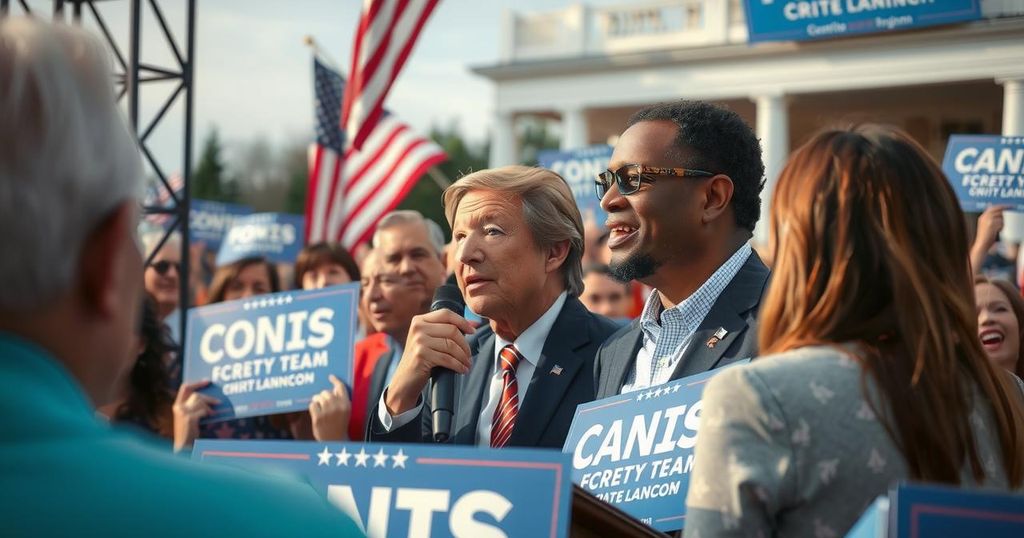Politics
7TH CONGRESSIONAL DISTRICT, AFRICA, ALASKA, BRIAN MORAN, CENTRAL INTELLIGENCE AGENCY, CIA, CIVIL RIGHTS, DEMOCRATIC PARTY, ELECTION, LEGISLATION, MARINE CORPS, MCA, MORAN, NEW JERSEY, OBAMA ADMINISTRATION, PRESIDENTIAL ELECTION 2024, SOUTH AFRICA, TOM PERRIELLO, VIRGINIA
Fatima Khan
0 Comments
Virginia Gubernatorial Election Preview: Limited Opposition and Ranked-Choice Voting Outcomes
The Virginia gubernatorial election of 2025 is characterized by limited opposition in the primaries, with Abigail Spanberger running unopposed for the Democrats while two Republicans contest the nomination. Alaska’s ranked-choice voting system was upheld after a recount, contrasting with several states that rejected such reforms. An overview of recall elections indicates that only 16% of targeted officials were removed over a nine-year span.
As the 2025 Virginia gubernatorial election approaches, the Democratic primaries face minimal opposition, sparking interest in a unique electoral scenario. Abigail Spanberger is currently running unopposed for the Democratic nomination, while the Republican primary features Winsome Sears and Merle Rutledge. Spanberger, a former CIA case officer, advocates for reducing childcare costs, highlighting challenges faced by Virginia families. On the Republican side, Sears, the incumbent Lt. Governor, emphasizes her commitment to the state’s right-to-work laws. Historically, gubernatorial primaries in Virginia have demonstrated a pattern of competitiveness, with few instances of candidates running unopposed.
Furthermore, Alaska recently confirmed the retention of its ranked-choice voting system following a recount, despite several states such as Arizona and Oregon rejecting similar measures. This ongoing debate surrounding electoral reform is particularly relevant as proponents like FairVote CEO Meredith Sumpter advocate for RCV as a progressive strategy, countered by opponents such as Trent England who criticize the influence of external funding in such campaigns. Additionally, it is notable that between 2014 and 2023, only 16% of officials targeted for recall were successfully removed from their positions. These factors highlight the evolving landscape in American elections and the varying levels of public support for different voting systems across states.
The article examines the lead-up to the Virginia gubernatorial election slated for 2025, outlining the current candidates and the political context of the primaries in Virginia. Traditionally, gubernatorial races have seen fluctuations regarding competitiveness, with varying levels of opposition among candidates. Furthermore, the article discusses Alaska’s retention of ranked-choice voting amid a backdrop of statewide ballot measures, contrasting the success in Alaska with failures in other states, emphasizing the ongoing national debate regarding electoral systems. Finally, it sheds light on recall elections, revealing the percentage of targeted officials removed from office across a span of years, providing insights into political accountability and the effectiveness of recall efforts.
In summary, the upcoming Virginia gubernatorial election portrays a landscape largely favorable to the Democratic candidate due to a lack of opposition. In contrast, Alaska’s decision to maintain ranked-choice voting amidst mixed receptivity across other states illustrates the complexities surrounding electoral reforms. Additionally, historical data on recall elections underscores the challenges faced by advocates seeking to hold elected officials accountable. These dynamics collectively reflect the intricate nature of American political elections.
Original Source: news.ballotpedia.org




Post Comment